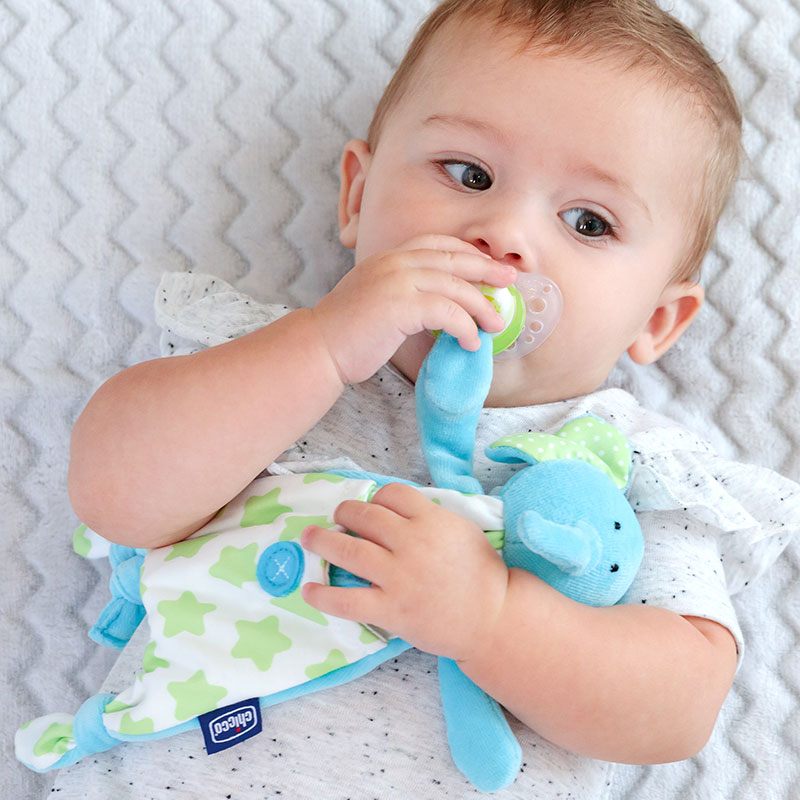
A fussy newborn or infant is so challenging on a parent. If you searched for this article, we don’t have to tell you. All babies cry—after all, it’s their primary means of communication—but what do you do when the fussing is starting to drive both you and your baby to (even more) tears?
When it comes to soothing a fussy baby, first remember that there’s a reason your baby is crying so persistently. It isn’t simply to give you dark circles. The second thing to do is figure out what that reason is, so let’s dive in.

This is the million-dollar question for parents, but again, there is a reason. Here are some of the more common culprits of a fussy baby.
- Hunger. Can you blame them? No one likes to be hungry. If you have a fussy newborn, there’s a good chance their stomach is growling. Newborns nurse or take a bottle roughly 8 to 12 times in a 24-hour period. If it’s been a few hours since they last fed, look for signs of hunger, such as lip smacking, bringing their hands to their mouth, or rooting. If any of these are happening, it’s time to feed.
- Dirty Diaper. Despite how often babies fill a diaper, it doesn’t get more comfortable to sit in a wet or dirty one. Check to see if your fussy newborn has a wet or dirty diaper and change it if so to stop the tears.
- Gas. A baby’s nutrition intake requires gulping, and gulping creates air in the stomach and digestive tract. That trapped gas can be quite uncomfortable for a tiny body. If you didn’t successfully burp your baby after their last feeding, try patting them gently on the back to dislodge any painful gas.
- Fatigue. Newborns sleep in spurts for a total of 14 to 17 hours a day. It could be that they’re tired and need to be laid down for some rest.
- Boredom. Yes, babies get bored just like you do. If they’re stuck in front of the same scenery for too long, they become restless. In this case, take your baby on a walk, even if it’s just around the house or the yard. Bring them to a window so they can look out at something new. Play peek-a-boo, give them an interesting toy, or read them a book with pictures.
- Overwhelm. Babies also get overwhelmed when there’s too much stimulus, such as being around a lot of people, experiencing a lot of noise or bright lights, or being moved around too much. When this happens, take your baby to a quiet, peaceful spot and cuddle them in just silence or with a tranquil ambient sound. A pacifier can help provide comfort, as can swaddling them in a blanket. Dim the lights and remove distractions.
- Temperature. A baby will cry if it’s too hot or too cold. Add or remove layers if you think this is the case.
- Illness. Not feeling well can make anyone cry. If all else has failed, take your baby’s temperature, and call your pediatrician if your little one shows signs of being sick.
- Colic. Colic is a bit of a catch-all term for a condition in which otherwise healthy babies cry excessively for no apparent reason. Roughly one in five infants experiences colic, and the unfortunate news is that, more or less, it just takes time for them to grow out of. Doctors typically diagnose infant colic based on the baby exhibiting crying that totals at least three hours a day, happens at least three days a week, and persists for at least three weeks in a row. If you think your baby is experiencing colic, call your pediatrician.
It’s likely the fussing is occurring for one or multiple reasons on this list. If none of these explanations seem to fit or provide relief, contact your doctor for help.
“Normal” can become a bit of a rabbit hole for new parents. Yes, it’s normal for babies to cry quite a bit—remember, it’s their only way of telling you something’s not right. Typically, it’s for one of the above explainable reasons. Newborns in particular will cry for two or three hours a day. Eventually, you’ll get the hang of being able to tell the difference in your baby’s cries and whether they’re fussing over a run-of-the-mill, easily fixable reason like hunger or a dirty diaper, or whether they’re experiencing a more intense issue.
Within a couple of months, you’ll have likely learned what a normal, everyday cry sounds like from your baby. If you begin hearing a cry that’s much louder or much softer than usual, they could be experiencing some sort of more aggravated distress. A louder, piercing wail, for instance, could be contributed to colic. Softer, more whimper-like crying could indicate illness. There’s no hard-and-fast definition of what “normal” crying is, but you’ll come to know it when you hear it. And when it’s not normal, it’s time to call the doctor.

So you’ve fed, changed, burped, held, and entertained your baby, and your doctor has ruled out colic and illness, and she’s still crying. What now? The good news is that there are some tried-and-true ways to soothe a baby you can turn to and reclaim your sanity.
- Rocking or swaying. Babies like rhythmic motion. They spent nine months feeling your every move in the womb, so rocking, swaying, and bouncing have become familiar and help to put them at ease. Try rocking your baby in a rocking chair or glider, or enlist a motorized baby swing or vibrating bouncy seat to provide some steady motion to help soothe a fussy baby.
- Swaddling. Again, we’re recreating the coziness of the womb. Swaddling a baby snuggly helps them feel safe and usually enables them to get to sleep more quickly.
- Thumb-sucking. The act of sucking soothes babies’ nerves. When it’s not feeding time, help your baby find his or her thumb or fist, or offer your own.
- Carrying. Wearing your baby using a carrier or sling is also comforting because of the closeness they provide, as well as the fact that the baby typically enjoys being walked around. A baby-wearing device is also convenient for you, since you can be hands-free.
- Using white noise. White noise machines, the whir of a fan, or your own shushing are all soothing sounds for a baby. You can also try humming or singing.
- Running a bath. If your baby is relaxed during bathtime, try popping them in the tub with some warm water for a little spa time.
- Going for a ride. You’ve likely seen this one in the movies. Putting the baby in the car seat and going for a drive is known to calm a fussy baby thanks to the sound and motion.
- Massaging. Everyone mellows out after a massage. It can actually be a great way for both you and your baby to wind down and bring on the sleep. Warm some baby-appropriate oil in your hands and glide them over your baby’s back, arms, legs, feet, hands, and stomach to release their tension.
- Working it out. If you suspect your baby has gas or is colicky, there are two moves to try. The first is placing them on their stomach while supporting their head. The pressure on the stomach can help relieve gas and discomfort. The second is to place them on their back and move their legs in a pedaling motion for the same reason.
- Going outside. Nature is innately soothing. Some fresh air plus new sights and sounds may be all she needs.
- Talking and playing. The name of the game might be distraction. Animatedly talk to your baby, make funny faces, dance, roll around, rattle a toy. It may be the last thing you want to do, but having some fun could change the atmosphere for both of you and help you move on from a fit.
Though all your energy is going into soothing your baby, try to spare a little to take care of yourself as well. Remember that your baby is not upset with you, and fussiness lessens in most cases as your baby gets older, so hang in there and try not to be hard on yourself. When the fussiness is pushing you to your limit, it’s time to take a step back. Put on a soothing song or sound, take some deep breaths, maybe go sit outside for a few minutes. Call your partner, friends, or family members for support. Hand off the baby when there’s someone you trust nearby to give yourself a break. Try not to have high expectations of getting anything big accomplished. Focus on small, doable tasks you can do mindlessly.
In any case, if you find yourself getting really angry, unstable, or otherwise mentally or physically struggling, always call your doctor sooner than later. Don’t quietly suffer. You deserve help soothing your baby. Lean on loved ones to get you through this season that will pass, and communicate honestly with your medical provider for guidance.
Babies are blessings, but not everything is cute. When the crying just won’t stop, run through these lists of why they may be fussing and what actions you can take to offer comfort. Since you’re certainly not the first parent to struggle with a fussy baby, virtually every baby retailer has soothing toys and accessories to help you calm your little one. Chicco has a variety of soothing accessories, like pacifiers and pocket buddies that can provide you with some relief. Shop our soothing accessories to find a fussy baby helper.
